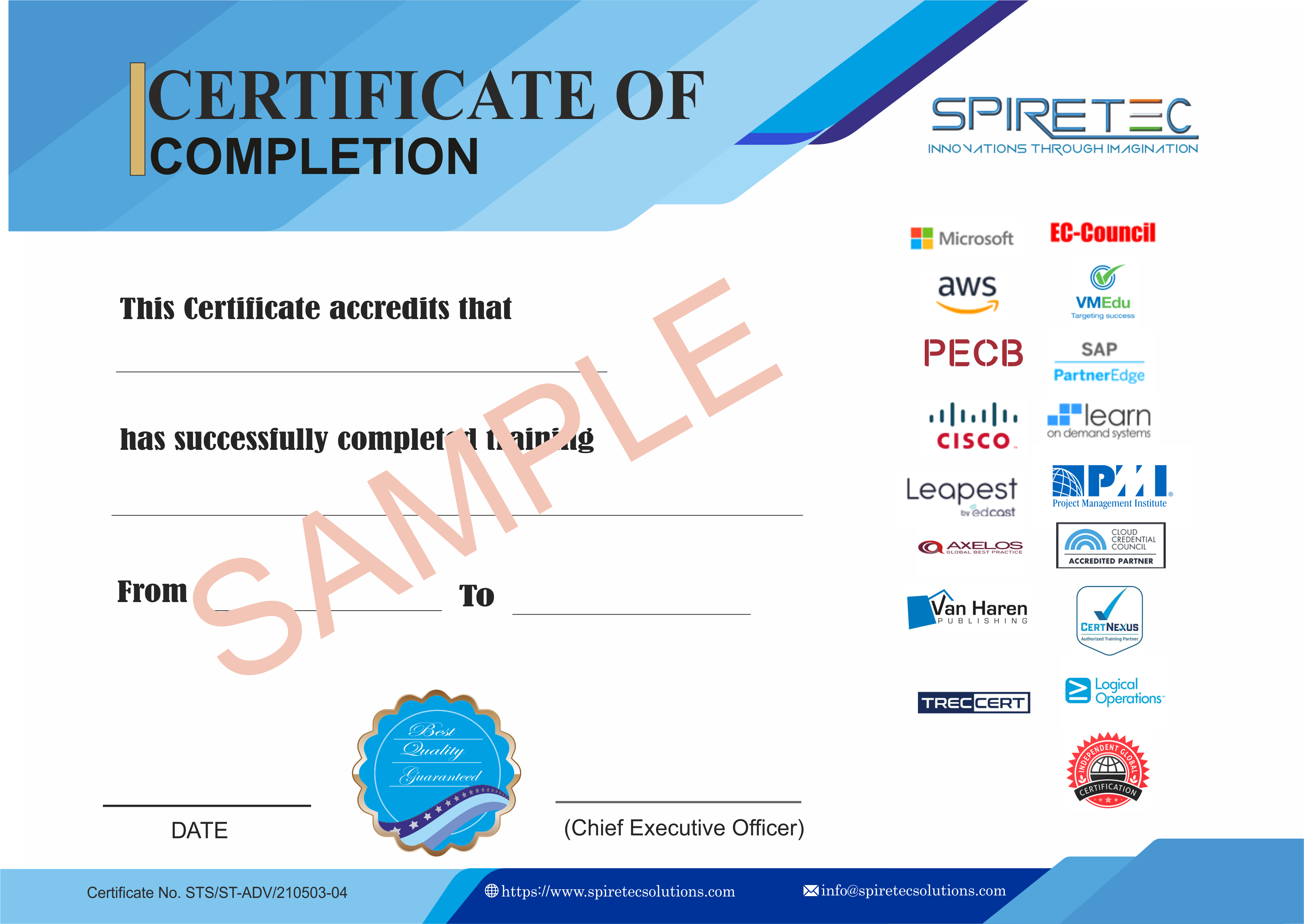The Certified Information Systems Auditor (CISA) course is a globally recognized certification for professionals in IS audit control, assurance, and security. This course is designed to equip learners with the skills needed to assess and manage an organization's information systems and technology effectively. It focuses on five key domains: Information Systems Auditing Process, Governance and Management of IT, Information Systems Acquisition, Development, and Implementation, Information Systems Operations and Business Resilience, and Protection of Information Assets. Each domain is structured to provide in-depth knowledge and practical insights into IS auditing and management.
Learners who complete the CISA course will be prepared to handle IT governance, system auditing, and security management, thereby enhancing their professional credibility and expanding their career opportunities in the field of information systems audit.
Course Prerequisites
To successfully undertake the CISA course, the following prerequisites are recommended:
-
Understanding of Basic IT Concepts: Familiarity with general IT terminology and concepts to grasp technical discussions within the course.
-
Awareness of Business Processes: Basic knowledge of how businesses operate, including an understanding of common business processes and the role of information systems in supporting them.
-
Experience in IT or Audit: Prior experience in IT, cybersecurity, or audit-related roles is beneficial but not mandatory.
-
Analytical Skills: Ability to analyze and interpret information, as auditing involves assessing complex systems and processes to identify risks and control weaknesses.
-
Ethical Mindset: A strong sense of ethics and integrity, essential for auditors.
-
Commitment to Professional Development: Willingness to engage in continuous learning, as the field of information systems auditing is constantly evolving.
-
Proficiency in English: Ability to read, write, and comprehend English, as the course materials and the CISA certification exam are presented in English.
Target Audience
The CISA course is ideal for IT professionals aiming to enhance their skills in managing and protecting information systems within organizations. The target audience includes:
-
IT Auditors
-
Information Security Analysts
-
Information Systems Control Professionals
-
Chief Information Officers (CIOs)
-
Chief Technology Officers (CTOs)
-
IT Risk Managers
-
Security Consultants
-
Compliance Officers
-
IT Assurance Professionals
-
Cybersecurity Professionals
-
Corporate IT Governance Managers
-
Quality Assurance (QA) Managers
-
IT Consultants
-
Network Operation Security Engineers
-
IS/IT Consultants
-
IT Project Managers
-
Regulatory Compliance Managers
-
Data Privacy Officers
-
IT Forensic Investigators
-
Systems Analysts or Developers with a focus on security and compliance
Learning Objectives - What You Will Learn in this CISA Course
The CISA course focuses on key areas of IS auditing and management, providing learners with the following outcomes:
-
IS Auditing Process: Learn to plan and execute information systems audits in accordance with IS audit standards, guidelines, and codes of ethics.
-
IT Governance: Understand and evaluate the effectiveness of IT governance, including strategy alignment, resource management, and performance monitoring.
-
Risk and Control Assessment: Acquire the skills to assess risks and controls within business processes and information systems and propose improvements.
-
Compliance Management: Learn to manage IT-related frameworks and ensure compliance with laws, regulations, and industry standards.
-
Systems Acquisition and Implementation: Gain proficiency in overseeing information systems acquisition, development, and implementation projects, including project management and system migration.
-
Operations and Business Resilience: Master the concepts of information systems operations, IT asset management, and systems performance management, and enhance business resilience through effective business continuity and disaster recovery plans.
-
Protection of Information Assets: Attain expertise in protecting information assets through security frameworks, identity and access management, and encryption techniques.
-
Security Event Management: Learn to identify and respond to security events using security testing and monitoring tools, and manage incident response.
-
Forensic Investigation: Prepare to collect and handle audit evidence and understand the principles of forensic investigation to support legal and organizational objectives.
Course Outline:
Domain 1—INFORMATION SYSTEMS AUDITING PROCESS - (21%)
Providing audit services in accordance with standards to assist organizations in protecting and controlling information systems. Domain 1 affirms your credibility to offer conclusions on the state of an organization’s IS/IT security, risk, and control solutions.
A. Planning
-
IS Audit Standards, Guidelines, and Codes of Ethics
-
Business Processes
-
Types of Controls
-
Risk-Based Audit Planning
-
Types of Audits and Assessments
B. Execution
Domain 2—Governance and Management of IT - (17%)
Domain 2 confirms to stakeholders your abilities to identify critical issues and recommend enterprise-specific practices to support and safeguard the governance of information and related technologies.
A. IT Governance
-
IT Governance and IT Strategy
-
IT-Related Frameworks
-
IT Standards, Policies, and Procedures
-
Organizational Structure
-
Enterprise Architecture
-
Enterprise Risk Management
-
Maturity Models
-
Laws, Regulations, and Industry Standards affecting the Organization
B. IT Management
-
IT Resource Management
-
IT Service Provider Acquisition and Management
-
IT Performance Monitoring and Reporting
-
Quality Assurance and Quality Management of IT
Domain 3—Information Systems Acquisition, Development, and Implementation - (12%)
A. Information Systems Acquisition and Development
-
Project Governance and Management
-
Business Case and Feasibility Analysis
-
System Development Methodologies
-
Control Identification and Design
B. Information Systems Implementation
-
Testing Methodologies
-
Configuration and Release Management
-
System Migration, Infrastructure Deployment, and Data Conversion
-
Post-implementation Review
Domain 4—INFORMATION SYSTEMS OPERATIONS AND BUSINESS RESILIENCE - (23%)
Domains 3 and 4 offer proof not only of your competency in IT controls but also your understanding of how IT relates to business.
A. Information Systems Operations
-
Common Technology Components
-
IT Asset Management
-
Job Scheduling and Production Process Automation
-
System Interfaces
-
End-User Computing
-
Data Governance
-
Systems Performance Management
-
Problem and Incident Management
-
Change, Configuration, Release, and Patch Management
-
IT Service Level Management
-
Database Management
B. Business Resilience
-
Business Impact Analysis (BIA)
-
System Resiliency
-
Data Backup, Storage, and Restoration
-
Business Continuity Plan (BCP)
-
Disaster Recovery Plans (DRP)
Domain 5—Protection of Information Assets - (27%)
Cybersecurity now touches virtually every information systems role, and understanding its principles, best practices, and pitfalls is a major focus within Domain 5.
A. Information Asset Security and Control
-
Information Asset Security Frameworks, Standards, and Guidelines
-
Privacy Principles
-
Physical Access and Environmental Controls
-
Identity and Access Management
-
Network and End-Point Security
-
Data Classification
-
Data Encryption and Encryption-Related Techniques
-
Public Key Infrastructure (PKI)
-
Web-Based Communication Techniques
-
Virtualized Environments
-
Mobile, Wireless, and Internet-of-Things (IoT) Devices
B. Security Event Management
-
Security Awareness Training and Programs
-
Information System Attack Methods and Techniques
-
Security Testing Tools and Techniques
-
Security Monitoring Tools and Techniques
-
Incident Response Management
-
Evidence Collection and Forensics







 Live Online Training (Duration : 40 Hours)
Live Online Training (Duration : 40 Hours)
